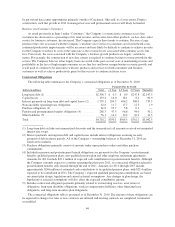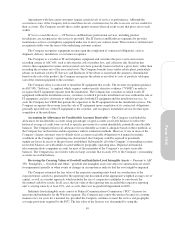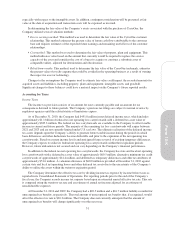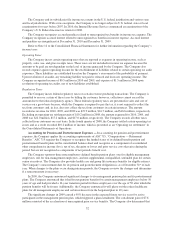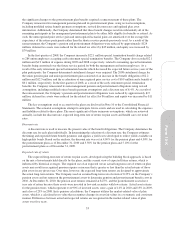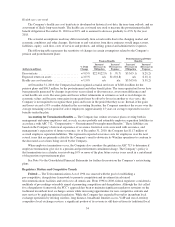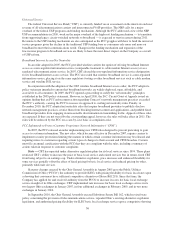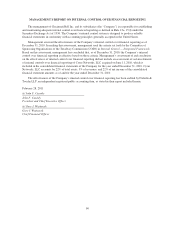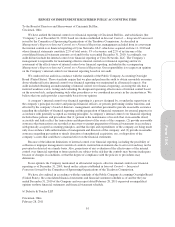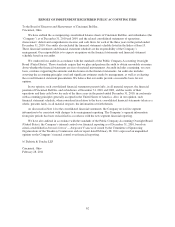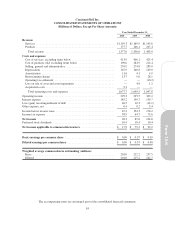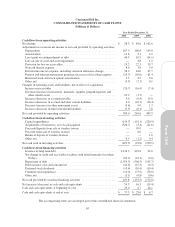Cincinnati Bell 2010 Annual Report Download - page 145
Download and view the complete annual report
Please find page 145 of the 2010 Cincinnati Bell annual report below. You can navigate through the pages in the report by either clicking on the pages listed below, or by using the keyword search tool below to find specific information within the annual report.
exchange services, which remain subject to varying levels of regulation. Since 2009, federal regulators have
primarily focused on initiatives to promote investment in and adoption of advanced telecommunications services,
particularly broadband Internet access services.
On March 17, 2010, the FCC released a National Broadband Plan (“NBP”), as mandated by Congress, to
ensure that every American has access to broadband services. The FCC released an action agenda containing
benchmarks for implementing the NBP recommendations that fall under its jurisdiction. The recommendations
have been grouped into four key areas: (1) accelerating universal broadband access and adoption, (2) fostering
competition and maximizing consumer benefits, (3) promoting world-leading mobile broadband infrastructure
and innovation, and (4) advancing robust and secure public safety communications networks. The majority of
FCC regulatory proceedings are now focused on the fulfillment of the goals of the NBP. While the FCC took
steps to implement some of the NBP recommendations during 2010, implementation of the more complex and
controversial recommendations may span several years. Moreover, an opinion from the D.C. Circuit Court of
Appeals in April 2010 called into question the legal theory that the FCC had been using to justify regulation of
broadband Internet communications. In light of the D.C. Court’s ruling, the FCC spent much of 2010 reassessing
its legal authority to implement some of the NBP recommendations, slowing action on some of the NBP-driven
proceedings. During 2011, however, the FCC is expected to refocus its attention on the remaining NBP
recommendations. The financial impact of the various federal proceedings will depend on many factors including
the extent of competition, the timing and outcome of the FCC’s decisions, and any appeals of those decisions.
Intercarrier Compensation
Current rules specify different means of compensating carriers for the use of their networks depending on
the type of traffic and technology used by the carriers. The FCC has an open proceeding to consider various
proposals for revising the disparate intercarrier compensation system into a regime that treats all traffic
uniformly. The NBP recommends that the FCC create a glide path to eliminate per-minute intercarrier
compensation charges over an eight to ten year period. Although the FCC has been considering proposals to
eliminate per-minute intercarrier compensation charges for the past ten years, it is expected to renew efforts to
develop a sustainable plan in early 2011 in light of the NBP recommendation. The outcome of this proceeding
could have a significant effect on all carriers and could impact the switched access and end-user components of
CBT’s revenue.
Special Access
In early 2005, the FCC opened a proceeding to review the current special access pricing rules. Under the
existing rules, CBT’s special access services are subject to price cap regulation with no earnings cap. This
proceeding reexamines the entire special access pricing structure, including whether or not to reinstate an
earnings cap. As recommended by the NBP, in 2010 the FCC continued to analyze whether the existing rules
ensure just and reasonable rates. This investigation is expected to continue through 2011.
VoIP
In 2004, the FCC declared that VoIP services are interstate services and purportedly preempted state
regulation. However, the FCC’s rulemaking proceeding to determine the regulatory status of IP-enabled services
generally remains open. Although not classifying VoIP as a telecommunications service or information service,
the FCC has extended many traditional telecommunications service obligations to VoIP service providers,
including 911, universal service funding, local number portability, and regulations governing customer
proprietary network information. Meanwhile, several state commissions have continued to challenge whether
prior FCC orders have preempted state regulation of VoIP services. In November 2010, the FCC declared that
states may levy USF assessments on nomadic VoIP service intrastate revenue. In response to several petitions,
the FCC has also ruled that peer-to-peer Internet voice services that utilize Internet Protocol (“IP”) and that do
not use the public switched telephone network (“PSTN”) are not subject to access charges. Separately, it has
ruled that services that originate and terminate on the PSTN but employ IP in the middle are subject to access
charges. The FCC is still considering other VoIP petitions, including one that seeks to exempt from access
charges calls that originate using VoIP but terminate on the PSTN.
55
Form 10-K



